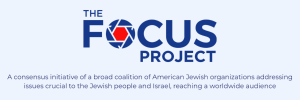
![]()
STAY INFORMED – TALKING POINTS – ACTIONS TO CONSIDER – STORIES MAKING NEWS
![]()

Shockingly, in the nation’s capital, an enraged gunman brutally murdered an American Jew and an Israeli Christian on the street in front of the Capital Jewish Museum – little more than a mile from the White House. In a carefully planned act of terror, gunshots and screams shattered a peaceful interfaith gathering. This intentional assault on the Jewish community – fueled by dangerous rhetoric building over years – highlights how violence becomes inevitable when hate is normalized. The incident forces Jewish organizations to further confront an escalating threat that demands heightened and costly security measures.
Terrorism Strikes America’s Capital: ‘Free Palestine’ Reaches Fateful Climax
Chicago-born shooter Elias Rodriguez fatally shot Sarah Milgram, a young Jewish woman from Kansas and killed her boyfriend Yaron Lischinsky. While Sarah tried to crawl away, the terrorist pursued her, shooting the 26-year-old research professional again. While Milgram was still alive, he reloaded his handgun and kept shooting to ensure she was dead. He said his actions were “for Gaza” and to “free Palestine.” Lischinsky, 30, had planned a marriage proposal in Jerusalem a week later.
The shooter attacked a multifaith and humanitarian aid event hosted by the American Jewish Committee. In a tragic twist of irony, the victims were Jewish and Christian staffers from the Israeli embassy – both devoted peace advocates. Driven by blind hatred, the shooter sought to kill American Jews – murdering those who championed the very principles of peace and coexistence he claimed to fight against. Speaking at Milgram’s funeral, Rabbi Doug Alpert: “If you really wanted to know how to give Palestinians a better life, a life of humanity and dignity, to get needed aid into Gaza, you could have asked Sarah.”
Event organizer JoJo Drake Kalin: “The event theme was our collective humanity, humanitarian aid and bridge-building. It’s so deeply ironic that we were all there in a nonpolitical way – Jews and non-Jews alike, representatives of 30 embassies – with the intention of turning pain into purpose.”
The victims in their own words:
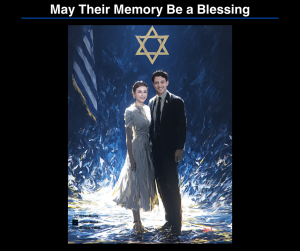
Critical Need for Jewish Community Security: ‘Attack was just a matter of time’
The D.C. shooting exposed the lack of adequate security despite repeated warnings of multiple law enforcement agencies and Jewish American groups – amid historic violence against Jews nationwide. This tragedy highlighted the urgent and ongoing need for enhanced security measures in Jewish communities. Terrorists in America have targeted Jews at synagogues, community centers, businesses, the U.S. Holocaust Memorial Museum and now the Capital Jewish Museum. The perpetrators killed Jews and non-Jews, and came from various ethnic and religious backgrounds.
Jewish communities across the country shoulder a significant financial burden for security – costs for synagogues sometimes reach one-third of their budgets. In response to the recent shooting, 42 Jewish groups called for $1 billion in federal funding to secure Jewish communities – by comparison, European governments often bear a greater share of security expenses.
“The murders were the direct consequence of rising antisemitic incitement in places such as college campuses, city council meetings and social media that has normalized hate and emboldened those who wish to do harm,” the 42 groups stated. “All Americans have the right to feel safe and secure. This is a problem not just for the Jewish community, but for every American community.” U.S. Jewish security leaders urged vigilance amid a threat of copycat attacks.
Immediately after the shooting, local resident Jim Rose visited the scene and expressed thoughts shared by many American Jews: “There was a shock, but there was no surprise. It was just a matter of time before something like this happened in our community. I’m just frustrated that more wasn’t done to prevent this. You could just see it building, just with the rhetoric and what is allowed in protests.”
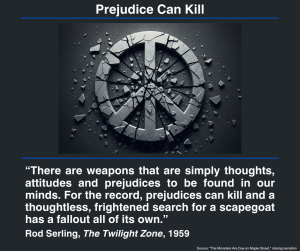
From Words to Action: ‘Globalize the Intifada’
Only days before the attack, a senior Hamas leader stated, “The time has come for everyone to take action. Everyone who can bear arms anywhere in the world must act. Spare no IED, bullet, knife or stone.” Progressive American influencer Hasan Piker hosted a 20,000-person live stream with an Australian guest who constantly urged Americans to randomly kill Israelis: “Weapons in America can be used very effectively”.
The shooter – who likely did not know the victims were Israelis – is linked to several Marxist groups that promote anti-American rhetoric and receive support from China and Iran. They have been involved in organizing anti-America and anti-Israel protests for years, including on university campuses. He was a member of the American Party for Socialism and Liberation. The day after the savage Hamas attack on Oct. 7, the party posted a video: “The U.S. is a terrorist. We have the historic responsibility of defeating Israel colonialism and U.S. imperialism. Palestine will be free.” Its leaders routinely praise the Oct. 7 attacks and call for “Death to America! Death to Israel!” The Qatari media and Iranian TV celebrated the murderer.
The radical American Unity of Fields organization is leading a “Free Elias” campaign. It stated that the attack was “legitimate, it was justice, where legal and moral duties meet. GLOBALIZE THE INTIFADA!” The group also supports a Palestinian terror group’s message that “targeting the enemy should not be restricted by geography.” Unity of Fields is funded by a Cox Media heir and was involved in protest planning at Columbia Univ. that targeted Jewish students and their allies.
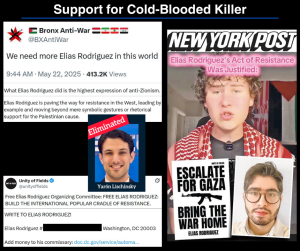
This latest attack is the most virulent manifestation of the chant – ‘Globalize the Intifada’ – but many other incidents in the days before and after the shooting around the world are a warning sign:
![]()

![]()

Protecting communities from violence and hatred, requires a united stand and a call for security:
![]()
May is Jewish American Heritage Month which celebrates Jewish contributions to America.
From baseball and football to hockey and tennis, Jewish Americans have made profound and lasting contributions to the landscape of American sports, helping to shape its history, culture, and values. From the early 20th Century to today, Jewish athletes have broken barriers, shattered records, won Olympic medals and served as symbols of pride and resilience. Icons like Hank Greenberg and Sandy Koufax not only excelled on the baseball field but also stood firm in their Jewish identity during times of widespread antisemitism – becoming cultural heroes admired by both Jewish and non-Jewish Americans. Their decisions—like Koufax famously sitting out a World Series game on Yom Kippur –highlighted the powerful intersection of faith, ethics, and athletic excellence.
Beyond baseball, Jewish athletes have left their mark across a wide range of sports. Olympic champions like Mark Spitz and Aly Raisman have stood atop the world stage, while basketball legends like Sue Bird and Dolph Schayes have helped define American excellence on the court. Coaches and executives such as Red Auerbach revolutionized team strategy and leadership, setting standards that still influence the game today. Through their talent, determination, and pride in heritage, Jewish American athletes continue to inspire future generations, showing that sports can be a powerful platform for identity, inclusion, and impact.
Baseball
Football
Basketball
Tennis
Olympics
How do you JAHM? Whether it’s reading a book by your favorite Jewish American author, watching a Mel Brooks comedy, or cooking Molly Yeh’s latest recipe, we want to know how you JAHM! When you post, use the hashtags #MyJAHM and #OurSharedHeritage to connect to the national celebration.
Click here to access the JAHM toolkit full of resources, posters, social media graphics and more.
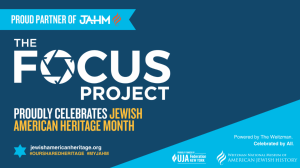
![]()

A Long-Overdue Tribute to Jewish Americans Killed in Combat
Operation Benjamin, a non-profit, is ensuring Jewish American service members who died fighting for their country are finally recognized with the Star of David on their grave markers in Arlington National Cemetery and other military cemeteries around the world. For more than 80 years, soldiers like Ben Zion Bernstein, a hero of the First Special Service Force killed in Italy during WWII, were mistakenly buried under Latin crosses.
The organization’s impact is profound, providing closure and a sense of justice for families. Second Lt. Paul Singer, an orphaned Jewish bombardier killed alongside Sheldon Finder in 1943, was mistakenly buried under a cross next to his Jewish comrade. His cousin, Jodi Reff, described feeling a deep connection, stating, “Paul lived as a Jew, fought for America and the free world as a Jew, and died as a Jew.” This vital work ensures that the sacrifices of these soldiers are fully and accurately commemorated, reflecting their faith and legacy for eternity.
Stories Impacting American Jews
Stories Impacting the U.S. and Israel
Stories From Around the World
![]()
Stay Informed | Speak Up | Take Action
Want to Read More of Our Talking Points? Did you miss a recent edition of The Focus Project? No need to search your inbox. Our most recently published editions are available on our website.
![]()

This content is developed by The Focus Project in partnership with MERCAZ USA. The Focus Project distributes weekly news and talking points on timely issues concerning Israel and the Jewish people, including antisemitism, anti-Zionism and the delegitimization of Israel. It represents a consensus view across a spectrum of major American Jewish organizations. MERCAZ USA recognizes and respects the diversity of views on these issues among its readers and the community at large.